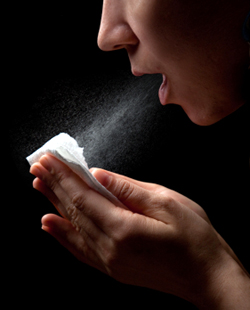 11/23/10 State health officials report that with more than 500 cases of pertussis (whooping cough), including two infant deaths, Indiana is experiencing its largest outbreak since 1959.
11/23/10 State health officials report that with more than 500 cases of pertussis (whooping cough), including two infant deaths, Indiana is experiencing its largest outbreak since 1959.
Pertussis is a contagious illness caused by bacteria. It may cause severe coughing fits that can interfere with breathing. Although pertussis is often milder in older children and adults, undiagnosed persons can transmit the disease to infants and young children. Pertussis can lead to pneumonia, seizures, and sometimes death. Most of these serious problems occur in infants who are younger than a year old.
“I find this outbreak particularly concerning because pertussis can be prevented with a vaccine,” said State Health Commissioner Gregory Larkin, M.D. “Children and adults, alike, are at risk for life-threatening infections from pertussis, but there is a safe and effective vaccine.”
Dr. Larkin says it is important both children and adults are up-to-date on all immunizations, including pertussis.
“The key to the success of the pertussis vaccine is for everyone to be vaccinated,” said Dr. Larkin. “When an infant is hospitalized or dies from pertussis, it is because someone in the child’s environment of family, friends, community members, and health care providers were themselves not vaccinated and therefore exposed a susceptible child to infection.
“Only when families, communities, and health care providers are fully vaccinated will we have a ‘cocoon of safety’ around those most vulnerable for severe illness, particularly those too young or too ill to get vaccinated,” said Dr. Larkin.
The symptoms of pertussis occur in three stages:
- During the first stage, symptoms are similar to a cold: slight fever, sneezing, runny nose, dry cough, loss of appetite, and irritability.
- During the second stage (about 1 to 2 weeks later), the cough becomes more intense. There may be short, intense coughing spells followed by a long gasp for air (this is when the “whoop” is heard). The coughing fits may be followed by vomiting, nose bleeds, or bluish color to the face.
- During the third stage, the cough is less intense and less frequent, and appetite begins to increase. Eventually the cough stops, although this may take several months.
According to Dr. Larkin, the pertussis vaccine (as well as other required childhood immunizations) is available for FREE for children who are uninsured, underinsured, or are eligible for Medicaid. Parents should contact their local health department or health care provider, or visit the Vaccines for Children section of the State Health Department Website at: www.in.gov/isdh/17203.htm for more information.
There are some additional steps people can take to prevent the spread of pertussis, as well as other respiratory diseases, like influenza:
- Clean – properly wash your hands frequently,
- Cover – cover your cough and sneeze, and
- Contain – contain your germs by staying home (or keep children at home from school) if sick.
“Grandparents, parents, brothers, sisters, aunts, uncles, medical providers, and community leaders all are part of the life-saving cocoon of protection for the most vulnerable members of our communities: our infants and those too ill to be vaccinated,” said Dr. Larkin. “Make it your responsibility to know the vaccine status of those in your family. Consult with your primary care doctor or your local health department to see if you and your family are fully protected, or go to: www.in.gov/isdh/17094.htm to determine which immunizations you should have.”














